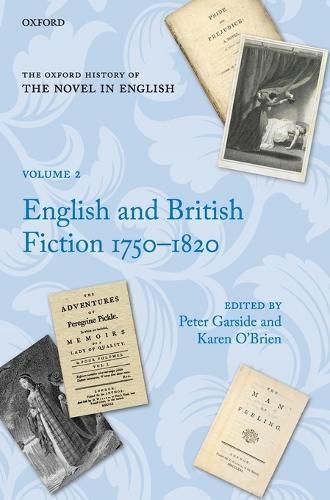Overview
The Oxford History of the Novel in English is a 12-volume series presenting a comprehensive, global, and up-to-date history of English-language prose fiction and written by a large, international team of scholars. The series is concerned with novels as a whole, not just the 'literary' novel, and each volume includes chapters on the processes of production, distribution, and reception, and on popular fiction and the fictional sub-genres, as well as outlining the work of major novelists, movements, traditions, and tendencies. Volume 2 examines the period from1750-1820, which was a crucial period in the development of the novel in English. Not only was it the time of Smollett, Sterne, Austen, and Scott, but it also saw the establishment and definition of the novel as we know it, as well as the emergence of a number of subgenres, several of which remain to this day. Conventionally however, it has been one of the least studied areas-seen as a falling off from the heyday of Richardson and Fielding, or merely a prelude to the great Victorian novelists. This volume takes full advantage of recent major advances in scholarly bibliography, new critical assessments, and the fresh availability of long-neglected fictional works, to offer a new mapping and appraisal. The opening section, as well as some remarkable later chapters, consider historical conditions underlying the production, circulation, and reception of fiction during these seventy years, a period itself marked by a rapid growth in output and expansion in readership. Other chapters cover the principal forms, movements, and literary themes of the period, with individual contributions on the four major novelists (named above), seen in historical context, as well as others on adjacent fields such as the shorter tale, magazine fiction, children's literature, and drama. The volume also views the novel in the light of other major institutions of modern literary culture, including book reviewing and the reprint trade, all of which played a part in advancing a sense of the novel as a defining feature of the British cultural landscape. A focus on 'global' literature and imported fiction in two concluding chapters in turn reflects a broader concern for transnat onal literary studies in general.
Full Product Details
Author: Peter Garside (Honorary Professorial Fellow, Honorary Professorial Fellow, University of Edinburgh) ,
Karen O'Brien (Vice Principal (Education) and Professor of English Literature,, Vice Principal (Education) and Professor of English Literature,, King's College London)
Publisher: Oxford University Press
Imprint: Oxford University Press
Dimensions:
Width: 18.10cm
, Height: 4.30cm
, Length: 25.30cm
Weight: 1.362kg
ISBN: 9780199574803
ISBN 10: 0199574804
Pages: 702
Publication Date: 05 February 2015
Audience:
College/higher education
,
Professional and scholarly
,
Tertiary & Higher Education
,
Professional & Vocational
Format: Hardback
Publisher's Status: Active
Availability: To order

Stock availability from the supplier is unknown. We will order it for you and ship this item to you once it is received by us.
Reviews
Jargon-free prose makes this important collection accessible to a wide range of readers ... Essential. * M. E. Burstein, CHOICE * This volume is a consummate piece of work that deserves pride of place on the shelves of research libraries. * Matthew Sangster, Library * Given its extraordinary range and depth, this volume does exactly what the general editor Patrick Parrinder describes as the aim of the Oxford History of the Novel in English series: 'to present the detailed history of the novel in a way that is both useful to students and specialists, and accessible to a wide and varied readership' (xvi). ... this collection will undoubtedly be indispensable for both teachers and students, and will surely be added to the reading lists of modules on eighteenth-century and Romantic literature. For literary scholars, this volume offers invaluable information about the current state of scholarship on the novel, and the ways in which vigorous debate and new evidence over the past few decades have shaped the field. It will surely enliven discussions for many years to come. * Yi-cheng Weng, The BARS Review *
Jargon-free prose makes this important collection accessible to a wide range of readers ... Essential. M. E. Burstein, CHOICE
This volume is a consummate piece of work that deserves pride of place on the shelves of research libraries. Matthew Sangster, Library Jargon-free prose makes this important collection accessible to a wide range of readers ... Essential. M. E. Burstein, CHOICE
Author Information
Peter Garside was educated at Cambridge and Harvard Universities, and taught English Literature for more than thirty years at Cardiff University, where became Professor of English and Director of the Centre for Editorial and Intertextual Research. Subsequently he was appointed Professor of Bibliography and Textual Studies at the University of Edinburgh. He has served on the Boards of Edinburgh Edition of the Waverley Novels and the Stirling / South Carolina Collected Editions of the Works of James Hogg, and has produced three volume apiece for each of these scholarly editions. He was one of the general editors of the ground-breaking bibliographical survey, The English Novel, 1770-1830, 2 vols (OUP, 2000), and directed the AHRB-funded online database, British Fiction, 1800-1829 (2004). Since retirement, he has continued to work on aspects of Romantic Studies, Scottish Literature, the Novel, and Book History. Karen O'Brien is Vice-Principal (Education) and Professor of English Literature in the Department of English. She studied at the Sorbonne for a year before attending Oxford University where she graduated with a BA in English Literature and a D.Phil. She was awarded a Harkness Fellowship which she spent as a visiting fellow at the University of Pennsylvania, followed by a Research Fellowship at Peterhouse, Cambridge. She has held academic posts at the Universities of Southampton, Cardiff, and Warwick. Her research is in the area of the literature and intellectual history of the Enlightenment, with a particular focus on historical writing, imperial thought, ideas and debates about gender equality and (most recently) the history of the novel and Thomas Robert Malthus.




